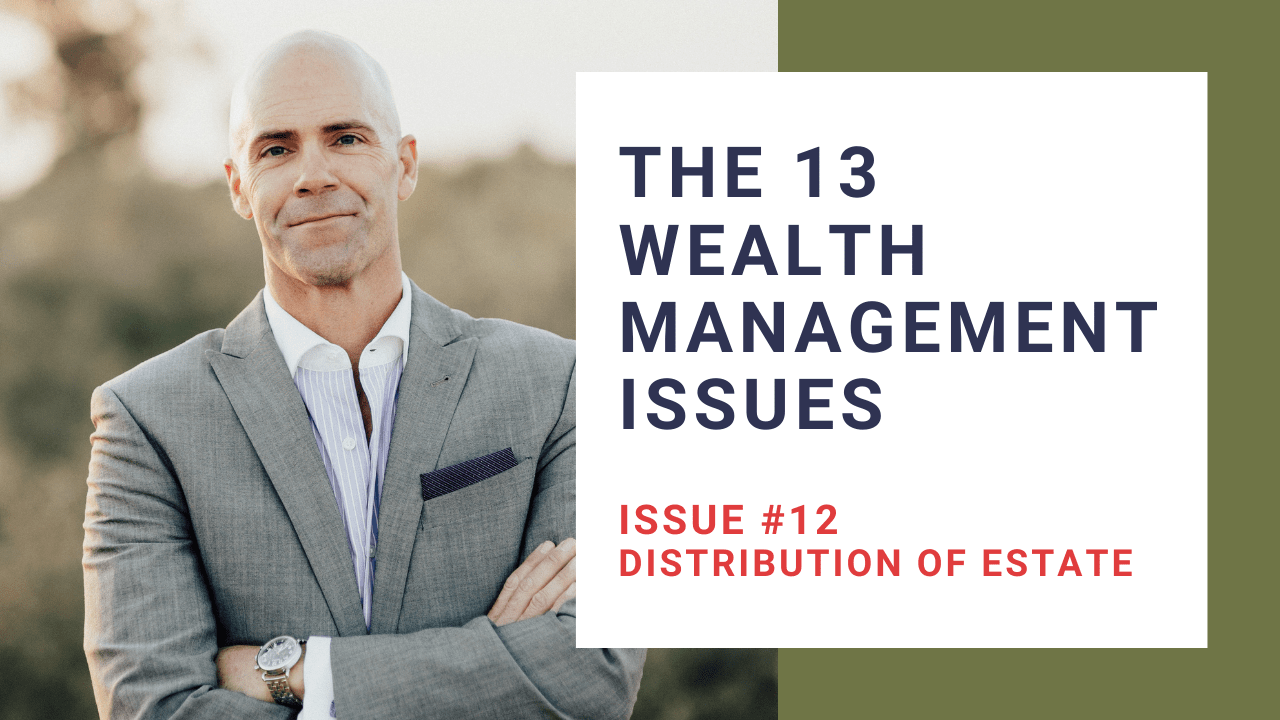
13 Wealth Management Issue #12: Distribution of Estate
When you consider the traditional financial path the majority of Americans take towards wealth creation, there are typically four phases: Accumulation, Transition, Decumulation, and Transfer. Transfer is referring to the transfer of financial assets to spouses, children, partners, or charitable causes through the Distribution of Estate. Our 13 Wealth Management Issue #12: Distribution of Estate has incredible meaning to folks having built their wealth, their business, their imprint on society, and on life. You’ve spent your entire life developing your wealth while providing lessons to your heirs and now it’s time to effectively transfer that which you’ve worked so diligently to build. Keep reading to learn more.
Distribution of Estate
Number 12 out of 13 in our Wealth Management Issues Series
The term “Estate” can be misleading as there are different uses of the word. At its core, it can be used to describe things like money and property that are accumulated by a person during their life, and which needs to be disposed or distributed at their death. Unless there are wills or trusts guiding the distribution, the person’s remaining estate may have to go through a probate court. Estate can also be used to just think about a person’s real estate holding.
In truth, only a very few Americans have Estate Planning tax issues and challenges. As the Estate Tax is handled by Congress, it is important to recognize that thresholds and exemptions on various taxes, including the Estate Tax, will change from time to time. As of today, unless a family has a combined net-worth of more than $22 million dollars, you don’t yet have an Estate Tax situation. As the estate tax is impacting fewer families, the spotlight is shifting to the type of legacy they will leave behind rather than focusing on the tax considerations only. The same tools, legal, and financial instruments that are used to transfer financial assets can also be used to transfer family values as well.
When we combine the financial aspects and the value aspect, there are four common Estate & Legacy planning goals shared by many of our clients. They are: 1) Maximize Wealth Transfer, 2) Minimize the Transfer Tax, 3) Optimizing Control or Influence, and finally, 4) Transferring Family Values. Let’s break down each one separately.
Maximize Wealth Transfer
Said plainly, we help families align their assets with their dispositive documents so they are consistent with their wishes, regulations, and taxes. It is important to ensure all of your assets are titled appropriately, that you have beneficiaries clearly and currently updated, and that documents like your wills and trusts are updated, aligned, and readily accessible.
Minimize the Transfer Tax
There is a certain amount of money that transfers without paying a transfer tax. There is an unlimited transfer to spouses. There are three ways to fulfill personal & tax objectives:
- Testamentary Exemption Amount
- Marital Trust
- Unlimited Charitable Deduction
Other issues to consider when evaluating minimizing the transfer tax include tax efficiency, estate liquidity, a QTIP, and a QDOT (for non-US citizen spouses). In the interest of blog space, each of these options requires diligence and expert counsel to know which and how to implement. As a business owner, know that we pay extra attention to the structure of your practice to ensure that your business transitions with minimal tax implications as well.
Optimizing Control or Influence
There are a number of considerations here that should be reviewed. If you have a family member with special needs, we can help you to consider a special needs trust. You may have special circumstances where beneficiaries engage in poor behaviors? We can help you consider different types of incentive-based trusts which provide beneficiaries with qualifiers, e.g. drug screening, jobs based, education based, etc to receive benefits. The more we know about your family dynamics, the better we can recommend the right solutions for those family dynamics.
Transferring Family Values
There are ways to use trusts to help you instill your family values into future generations, or to reinforce them. There are ways to tie distributions to heirs’ involvement with charities/philanthropic efforts, both with respect to participation and financial distributions if giving is important to you. There are also other requirements that can be placed on education in order to receive distributions.
The bottom line is that there are strategies that can be used to help you transfer your values to future generations, not just your financial assets. This is important as you do not want to make your last days someone else’s first day that they never have to work or give again. We work to understand where motivations lie and then plan where and to whom the legacy is directed in a manner congruent with the values of the donor.
There are many questions to consider when developing your distribution of estate transfer plan. Here is a list of some of those to help you begin the process.
- Are you certain that your distribution plan at death provides for the maximum amount of your wealth to pass free of taxes to your beneficiaries and heirs?
- Do you wish to leave all assets outright to heirs OR does the concept of leaving wealth in a donor advised fund to be used and distribute toward your wishes make sense?
- How prepared will your children and grandchildren be for inheritance by the time they receive distribution under your plan?
- What types of family conversations have you had regarding your estate plan?
- How have you coordinated titling of assets to facilitate your plan?
- What is most important to you? Does your plan reward hard work?
- Since change in circumstance occurs, are you willing to let your spouse/children make decision after your gone?
In our firm, we use INHERIT as a means by which to walk clients through the plan development process.
I – Integrated Choices: Who. What. How much. How to distribute.
N – Non-tax Reasons: Special needs. Special assets. Business owners/succession.
H – Heirs: Spouse: Re-marriage issues. Children. Grandchildren. Involvement. Charity.
E – Experienced Professional Advice: Coordinated advisory team – management & distribution.
R – Relating Your Plan: Plan communicated? How managed? Family understands?
I – Implementation: Who will implement? Family? Corporation? Combination?
T – Tax Elimination/Minimization: Transfer tax is voluntary. How much to pay?
The use of the acronym, INHERIT, helps to consider choices a high-net worth individual must address. There is no “one-size-fits-all” estate plan that works for every family and every business owner. There are several considerations, and it often takes several meetings to refine your plan. Not all of these choices are easy or pleasant to discuss, but failure to address these items ensures you have no input and that the courts will have a greater say in how and when your assets are distributed. We consider the choices made, your current situation, and steps already taken. Our approach is one of caution and great detail in order to provide you with the confidence that your financial assets and values will transfer to your family and designated institutions in the way that you choose.
When considering these issues, it’s important to ask yourself, how do any of these affect you, your family, and your goals? The following installments will cover each of these Wealth Management Issues in greater detail. Our hope is this series of chapters will provide not only an educational forum but also promote thought, leading to action…in a holistic manner, of course. Learn about our other 13 Wealth Management Issues here.
Watch our Whiskey & Wealth Wednesday video of this article:
If you would like to learn more about this subject please contact us and we’ll be happy to help.
By Anthony C. Williams, CWS, ChFC, MRFC, CLU | Investment Advisor Representative | President & Founding Partner of Mosaic Financial Associates & Orthopaedist Advisory Group | Securities and advisory services offered through Cetera Advisors LLC, Member FINRA/SIPC, a broker/dealer and a Registered Investment Advisor. Cetera is under separate ownership from any other named entity.







